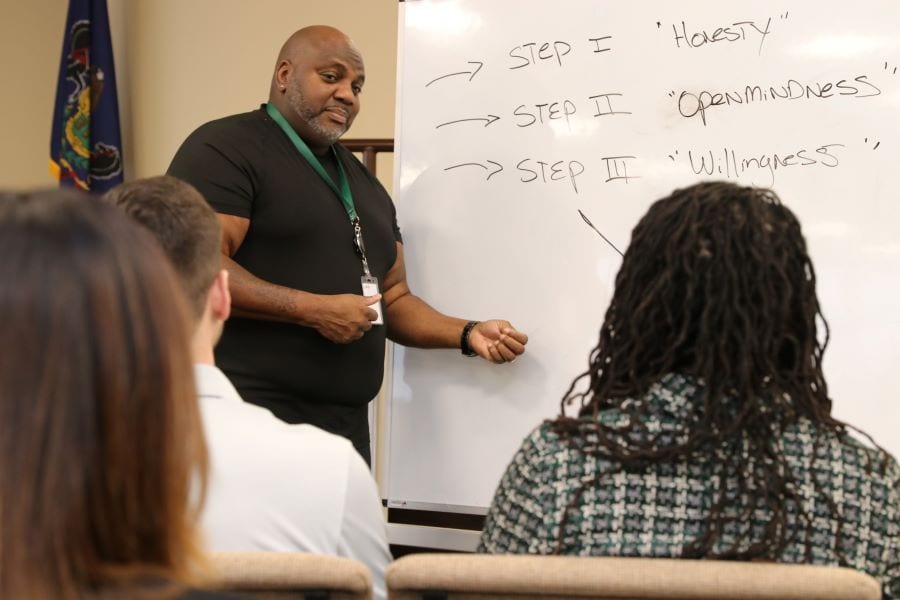Overcoming Addiction Stigma

There are many reasons why an addict might choose to avoid receiving help for their addiction. The primary misconception is the belief that the addiction has progressed so far that the user either does not realize how they are hurting themselves, or they simply want to keep using. This frequently leads to an impression that people who suffer from an addiction are weak-minded or somehow lesser to their fellow humans.
While there are cases where a person may not recognize the dangers of their own addiction or chooses to ignore it, more often than not the addict is aware and held back for a different reason. An addiction can happen to anyone, at any time in their life, and society’s belief that it is a mark of inferiority is nothing but false. Unfortunately, the prevalence of this belief creates a situation where the stigma of addiction may be the very reason that someone does not seek help even when they know they need it.
Understanding this misconception and learning to overcome stigma is a crucial step in creating a society where addiction cannot destroy a person’s life as easily as it does today. Imagine a world where addiction is not seen as a mark of shame, and where people can easily talk about their condition so that everyone is better equipped to spot the signs of drug abuse and recognize its dangers. The rate of addiction would drop drastically overall, as would the number of long-term use, criminal activity and fatal overdose.
This is the type of world that the treatment industry seeks to create, but only by educating the public can society hope to defeat the dangerous misconceptions of addiction stigma.
What is a Stigma?
A stigma is by no means a recently developed concept. It originates from the ancient Greek word “stizein,” which slaves were physically marked with to identify their low position in the social order. While there is no mark on a person’s skin today, stigma has evolved and is still carried with a person everywhere they go. It may be more difficult to see from the outside, but the damage and embarrassment is still there. Just as it did in ancient Greece, stigma remains a sign of disgrace that devalues a person in the eyes of the people around them.
Modern stigma can affect a person for all kinds of reasons, but one of the most common is in cases of mental illness, which includes substance use disorders. According to studies in the World Psychiatry Journal, there are two different kinds of modern stigma. The first of these is known as “public stigma,” and is described as the reaction that society itself has to a person with a trait that they consider to be negative. The second is called “self-stigma,” and is entirely an internal shaming that a person with a stigma carries out against themselves. This happens after the stigma has become so engrained in the individual’s belief system, that they no longer need society to shame them because they do it enough themselves.
Self-stigma is often the more dangerous type of stigma because it is difficult to spot. No one can see into another person’s mind and understand exactly what they are thinking, and for that reason it is impossible to know how they are putting themselves down. An individual suffering from self-stigma might be smiling on the outside and seem happy, but on the inside, they are torn apart by a war of feelings.
This is the stigma that few people like to talk about, and because of that, it is often the most harmful kind.
The Dangers of Stigma
Stigma gives people a negative impression of individuals diagnosed with a substance use disorder, and its presence can also cause serious harm to the recovery process. In addition to making a substance use disorder more difficult to bear simply for all the troubles that come with it, stigma makes addicts feel ashamed of their condition and afraid of how they will be treated if they are discovered.
As a result, it discourages them from revealing their disorder to others that could help them, instead driving them to do all that is their power to hide it. This prevents many cases of drug abuse being prevented or treated, before it can progress into later stages of addiction. If not for this stigma, individuals would likely acknowledge their substance abuse sooner, allowing them to get treatment earlier on.
Another contributing factor to stigma is the mental toll it can take on a person’s mind. As with many ideals that society pushes onto people, the negativity of stigma can become so engrained that the individual does not need anyone else to think less of them because they already do so themselves. Often, with more disgust than someone on the outside would display. This can become so prevalent that their mindset has them believe they do not deserve a chance at recovery, and instead are better off dead. When that mindset takes hold, a user is especially at risk and will likely continuing using with no regard to their safety, or the safety of others. Other mental conditions like depression are also almost certain to follow.
Overcoming Stigma
Although it is a difficult task in some situations, there are several valuable ways to overcome stigma and develop an accurate understanding of addiction. These range from working on your personal understanding and image, to reaching out to others to have experienced similar situations.
Some of the steps that an individual can take to help themselves and the world overcome stigma include:
Educate yourself
It is impossible to overcome a stigma without knowing the truth of the matter. Otherwise, the individual might simply be exchanging one misconception for another. As a result, the first step to defeating stigma is to begin learning the the truth about addiction, starting with how it is a disorder rather than a character flaw.
Here it would also be important to learn the development and progression of addiction, as well as to become aware of what options are available for someone that needs treatment. If the addict themselves is doing the research, they might try self-reflection during this stage to see if they can uncover what caused their life to take a turn toward addiction.
Create a positive space
Old habits and negativity encourage an addict to continue their substance abuse and reinforces the stigma mindset. Exposing them to a space that rejects the stigma and takes a positive approach toward acknowledging addiction, can serve as a powerful motivator for inspiring an addict and encouraging them to get help.
The process for building a positive space like this requires a person to change their lifestyle. This might start by removing any temptations within their normal environment, such as removing alcohol from the home or avoiding people that encourage drug use. From there, it is important for the individual to surround themselves with positive, healthy people that are willing to help them toward a path of sobriety. Since environment and social company plays an important role in aiding or hindering an addict’s journey, creating this space is a valuable tool for everyone.
Join a support group
Once an individual has committed themselves to becoming drug-free, they need to develop a plan that they can stick to along the way. This is often difficult for addicts because once they have reached the dependency stage, they may need help in holding themselves accountable for reaching their goals. Here, a support group of other recovering people can play a valuable role in their journey, as being surrounded by other goal-driven people makes it easier to achieve their own goals.
Even if a person is not an addict but a close friend or family member of one, there are support groups that can help them too. These operate in the same way as a support group for addicted individuals by bringing together multiple people in the same situation, allowing them to talk to and learn from each other while building an emotional support network that makes overcoming stigma easier.
Help others by speaking out
After an individual has helped someone else or personally overcome addiction, they should be sure to join the fight against stigma by speaking out. A large part of why stigma continues to exist is because the public is misinformed. Now that the individual has the knowledge and first-hand experience, they are in a powerful position to challenge the misconceptions of addiction and pave the way to a world where stigma cannot force people struggling from addiction to hide in shame or fear of what others will think.
There may be another person almost identical to them that is struggling from a substance use disorder in their life but afraid to act on it. By hearing the story of someone else overcoming a similar situation, that person might just find the inspiration they need to empower themselves and get the help they need.
Get Treatment for your Substance Use Disorder Today
No one should ever be afraid to admit they are struggling with a substance abuse problem and need help. Here at Brookdale, we understand the dangers of stigma and how difficult it can make an individual’s journey to recovery. When we break down these barriers and show society that addiction is a disease, we allow those in need of treatment to speak up and reach out.
A life free from the bondage of addiction is possible, and it begins by showing others that there is hope for the future. With the proper treatment and support systems in place, those trapped in the cycle of addiction can begin to heal and discover a Life…Recovered!
For immediate help or to find out more about our program, please contact us now at (855) 575-1292.

